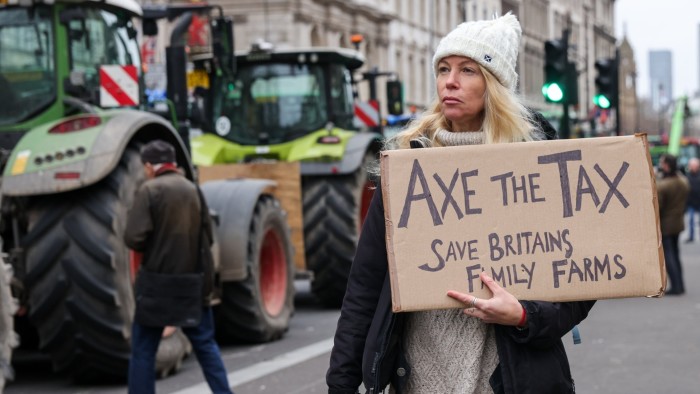Most UK agricultural estates can shoulder the cost of higher death duties without being forced to sell the family farm, according to analysis of Labour reforms that campaigners fear will hammer rural communities.
Eight in 10 farm estates affected by changes to the inheritance tax regime set out in the autumn Budget would be able to pay their entire IHT bill out of non-farm assets, according to a study by the Centre for the Analysis of Taxation, which produces independent academic research on tax policy.
Chancellor Rachel Reeves provoked uproar from rural communities in October by announcing that farmers with assets of more than £1mn will have to pay IHT from April 2026 as she sought to tackle loopholes in wealth taxation.
“Our analysis shows that the government’s reform largely protects family farms whilst limiting claims by the wealthiest estates,” said Andy Summers, director of CenTax and associate professor at the London School of Economics.
However, around 70 farming estates a year out of 1,560 in total could not cover the liability from non-farm assets, the report found.
Of these, around 40 farm estates a year would face a residual bill greater than 20 per cent of the farm’s income.
“The relief could be better targeted to reduce its use for tax planning and further extend protection for businesses, including farms,” Summers added.
The government’s IHT reforms prompted protests in London and sparked warnings from the National Farmers Union and the Country Land and Business Association that family farming would be threatened.
The sector fears that small rural businesses will be forced to sell their assets because of heftier IHT charges, which could undermine the country’s food security.
Despite earlier calls for a U-turn, the NFU welcomed the findings of the report, saying it presented an opportunity for the government to rework the reforms.
“There are interesting adjustments within the report, that appear to mitigate the impacts on the most vulnerable in our community and enable farms to invest in the future of food production with greater confidence,” said NFU president Tom Bradshaw.
The reforms state that the full 100 per cent relief from inheritance tax will be restricted to the first £1mn of the combined value of agricultural and business property per person. Above that threshold, the charge will be 20 per cent — half the standard 40 per cent rate of IHT.
The research was based on detailed analysis of HM Revenue & Customs data. It found that between 480 and 600 farm estates a year would be affected by the reform, representing under a third of farm estates.
Some 86 per cent of affected farm estates will have an IHT liability that is less than the value of the non-farm assets in the estate, meaning they could avoid selling the family farm to cover the costs of the levy.
Almost half of all impacted farm estates would face a tax increase of less than 5 percentage points as a result of the changes, it said.
Labour’s planned reform would “significantly reduce” the concentration of relief among the wealthiest estates, while protecting family farms “to a large extent”, it concluded.
The researchers put forward a number of options to extend protection for farms and other small businesses while reducing the use of agricultural and business property as a tax shelter.
Almost a third of impacted farm estates belong to individuals with annual income of less than £25,000 over the five years prior to their death.
Jeremy Moody, secretary of the Central Association of Agricultural Valuers, said the brunt of the tax will be carried by taxpayers who farm for a living.
“They still show that the owner of a few fields who does not farm gets more relief, confirming that this tax hits those [who] ministers said they protected,” Moody said, noting 43 per cent of affected estates potentially comprised “small family farms”.
The Tenant Farmers Association, which has argued that the government’s IHT reforms need to be tweaked rather than abandoned, welcomed the findings.
But TFA chief executive George Dunn said he was “disappointed” the proposed changes would still leave tenant farmers disadvantaged.
Reeves’ reforms are leading estates that are concerned about liquidity to shorten tenancy agreements, he said, arguing that landlords letting property through legally secure tenancies should be able to claim relief in full.
The Treasury has said that, with the reform, it will continue to provide £1.1bn of tax relief each year for agricultural and business assets. Almost three-quarters of estates claiming the IHT relief will be unaffected by these changes, it has said.
The government said the reforms had been designed to “address stark unfairness in the distribution of reliefs, whilst ensuring that the few estates facing higher bills can pay them in a manageable way”.
